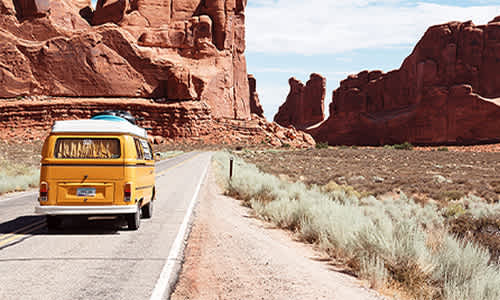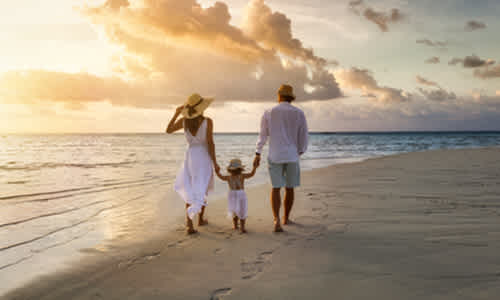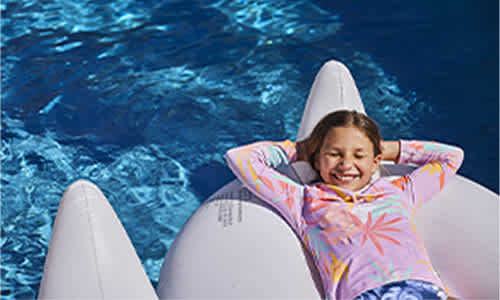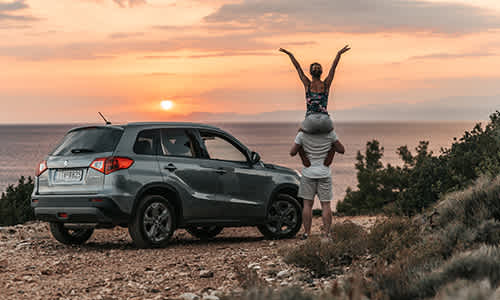Thinking of caravanning? Here’s how to plan the perfect trip

While international borders are set to open soon, many of you might still be thinking about exploring your own backyard: Australia.
Caravanning offers a unique opportunity to disconnect from the real world for a while (literally, often there isn't reception in remote areas), spend quality time with friends and family, and reconnect with nature. And, it's often a fraction of the price of a big overseas trip - but can often be longer!
So, if you're thinking of caravanning but aren't quite sure where to start, here's a practical guide to the #vanlife.
First thing's first: choose your vehicle
Before you get on the road, you'll need to decide exactly how you're going to get on the road. So, ask yourself the following questions to try and narrow down your options:
- What's your budget?
- How many people are going on the trip?
- How big a vehicle are you comfortable driving?
- What's the tow capacity of your car?
If it's just the two of you, or perhaps a couple and one or two small children, you can stick to the smaller vans, campers or caravans that can be towed by your car.
Entry level caravans tend to be small and come with a fixed layout, like a double bed, single dining area and a small kitchen and bathroom. These should do the trick.
If there's more of you, you may want to opt for a family-size caravan. These usually come with a retractable double bed, bunk beds and a larger dining area.
If you're after a little more comfort, and are comfortable handling a larger caravan, you can opt for a luxury caravan. These have a bedroom, full bathroom, kitchen and dining area and even an entertainment system.
Are you renting, or buying?
Your next decision is whether you're going to rent a caravan/campervan or purchase your own.
If you think you're going to caravan for a long time, or anticipate caravanning on the regular, then you may want to purchase one. If you do, there's obviously the purchase price of a caravan, which can range from around $30,000 to $50,000, depending on the model, and whether you buy it used or new.
Then there are the associated costs, like storage, insurance, services, and registration. These can add up to around $3,000 per year, so make sure you factor this into your budget.
If you don't have the funds to purchase a caravan upfront, and you need some help with finance, you may want to consider a personal loan. SocietyOne offers competitive personal loans, so you can finance your own caravan and experience your dream Aussie holiday.
Alternatively, you can rent a caravan. The average cost of renting a caravan over a two-week holiday in January (peak caravanning time) is around $2,000. A four-week off-peak holiday can cost around $2,500. And, you don't need to worry about storing it, or maintenance and registration costs.
Create your holiday budget
Once you've decided how you're going to get on the road, it's time to create a holiday budget.
In your budget, you'll need to consider:
-
Fuel costs: Because your car will be towing (a lot) more than usual, it will need more fuel than it usually does. And, fuel in remote areas often costs more than it does in urban areas, so you'll need to factor this in too.
A good way to budget for your fuel costs is to add up the number of kilometres you'll be driving and multiply that by the average fuel cost ($1.54).
-
Accommodation costs: Caravanning sites can be free, but they're aren't always. Powered sites can cost anywhere between $35 and $65 per night, while unpowered sites can range from $30 to $55 per night.
-
Meal costs: Most modern caravans come with a 'compressor' fridge, which means you can pack perishables on your trip. This means you can anticipate the costs of food during your trip by planning ahead. Try creating a rough weekly menu - and include one or two dining out costs per week (it is a holiday, after all!). This will help you set a budget for your food - and stick to it.
Planning your route
There's nothing worse than missing a turnoff, or getting lost down a dirt path. So, planning your route is absolutely key. Start by choosing your non-negotiable places.
Once you've got them down, plan a loose itinerary around them. Be open to slight detours - locals might give you intel that the internet can't!
It's also a good idea to time your trip with the seasons. If you want to visit the Top End, you'll need to visit during the dry season, which is between May and October. It's also a good idea to plan your trip around certain events or festivals, like Tassie's Dark Mofo (in June).
Some of the top places for caravanning in Australia are:
- Horseshoe Bay, South Australia
- Flinders Ranges, South Australia
- Blue Mountains, New South Wales
- Coffs Harbour, New South Wales
- Kalbarri, Western Australia
- Esperance, Western Australia
- Grampians National Park, Victoria
Packing your caravan
You know how you vow to pack light every time you go on a holiday, but you never do? It's time you stick to your word!
Caravans and campervans have legal weight limits, which means you need to be ruthless with your packing. If you don't need that extra set of dinner plates, don't bring them. Just bring the bare minimum that you and your travel partners need to stay comfy, and have a great time.
It's also a good idea to think about where and how you'll store your belongings. Some seasoned caravanners suggest vacuum sealing foods, putting everything in tupperware containers and investing in packing cubes for clothing.
You should also pack some essentials, like:
- A first aid kit
- Batteries
- Candles
- Mosquito coils and
- Antiseptics.
And you should also consider having some caravan gadgets on board, like:
- Toolkit
- Cable ties
- Tyre repair kit - and extra tyres!
- Spanners and
- A compressor.
And don't forget to save a heap of your favourite podcasts or playlists. The road can be fun, but long hours behind the wheel can get a little dull - not to mention dangerous - if you're not stimulated. Save them ahead of time so you don't need to worry about reception while you're out there.
Finding campgrounds
There are tonnes of campsites around Australia. The best way to find them is by plonking your destination into Google and searching for sites.
It's important to reserve your cabin or campsite ahead of your arrival - particularly if you're travelling during peak periods - even if they're free. And when booking, don't forget to specify whether you have any requirements, like an accessible cabin or a powered campsite.
You may also like
News, tips and offers straight to your inbox.


